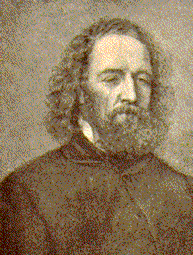Tennyson's "Faith" and Vision for Humanity

Note Tennyson's ideals in the following poems:
#95: Tennyson recalls an important experience on his lawn one evening after his friends had left. As he reads over letters from Hallam, he feels touched by his dead friend's memory. Then, this gives way to a sense of Hallam's actual presence and results in a feeling for the meaning of the world: "The steps of Time -- the shocks of Chance/ The blows of Death" (42-43). Soon, however, he returns to his doubt and the coming of the dawn.
106: Tennyson's New Year's Day poem. It sets forth his view of a new era free from class strife, war, and greed. Instead, it is a new millenium of nobility, equality, and truth. It sets aside "the darkness of the land" and brings in "the Christ that is to be" (31-32). (Is "Christ" here an actual figure or a symbol?)
#118: Tennyson contrasts the "work of Time" with its naturalistic, evolutionary "seeming-random forms" with the dead who exist as "a higher race" in a "higher place." He suggests that the suffering of this life "is not as idle ore" but that it leads to a higher evolutionary state for humanity in the afterlife, a state that sets to "working out the beast" and lets the animal existence pass away.
#124: Christ is found in Tennyson's faith, though not in Nature or his doubt. His faith is based in his emotion and intuition: "A warmth within the breast would melt/ [...] Stood up and answered, 'I have felt'" (12,14). His doubt cries out to one he knows is near. That mixture of faith and doubt can be compared to hands reaching out of the darkness of doubt.
Epilogue, lines 49ff: Tennyson again affirms his belief that evolutionary forces resulted in humans who have a sense of eternity and a connection between themselves and the "crowning race" of the spiritual dead. The dead have true knowledge about this present life. All that we experience here is to flower in the next life. Hallam is in God, a God "[t]o which the whole creation moves" (71).
Discussion Questions
- What is Tennyson's vision of the dead? Do you find it helpful or convincing? Why or why not?
- Describe Tennyson's vision of God and Christ. Is it an orthodox Christian one? How would a biblical understanding of human nature and of creation critique Tennyson's position?
- Can an evolutionary model of humanity and God be compatible with Christianity?
- Has Tennyson resolved his former doubts (#3, #50-58)? If so, do you find the resolution convincing?
